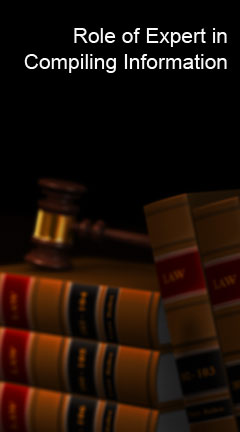Archival Notice
This is an archive page that is no longer being updated. It may contain outdated information and links may no longer function as originally intended.
Home | Glossary | Resources | Help | Course Map
The retaining attorney will rely on the expert witness to provide the information necessary to comply with the discovery rules. There are three general classes of information the expert may need to compile:
- Case-specific testing data and materials.
- Individual qualifications.
- Information regarding agency operation and practice.
Case-specific information may include:
- Reports.
- Lab testing notes.
- Chain of custody logs.
- Phone logs.
- Testing data.
- Testing procedural information.
- Secondary reviewer identification and notes.
- Any other information normally contained in the case file.
Individual qualifications are normally found in the expert's curriculum vitae (CV). Experts should ensure that their CV is current and accurate.
A discovery request may include items pertaining to a lab, a university, or employer documents. Agency background information normally includes:
- Agency policies and procedures manuals.
- Accreditation requirements, documentation and their status.
- Guideline compliance in particular disciplines (e.g., Scientific Working Groups in forensic science, such as SWGMAT, SWGDAM).
- Equipment used and relevant maintenance logs, calibration logs, quality assurance procedures and related logs.
- Quality control protocols and their related logs.
- Identification of external components used during testing (e.g., sexual assault kits, reagents, chemicals).
- Proficiency standards.
- Testing and results.
- Industry standard inspections and results.
- Proficiency test results.
- Complaints.
- Internal investigations.
- Conformance with discipline guidelines.
- Listing or explanation of requested documents not to be released by the lab.
- Reference to a standard discovery request (e.g., CD, sample request).
Additional Online Courses
- What Every First Responding Officer Should Know About DNA Evidence
- Collecting DNA Evidence at Property Crime Scenes
- DNA – A Prosecutor’s Practice Notebook
- Crime Scene and DNA Basics
- Laboratory Safety Programs
- DNA Amplification
- Population Genetics and Statistics
- Non-STR DNA Markers: SNPs, Y-STRs, LCN and mtDNA
- Firearms Examiner Training
- Forensic DNA Education for Law Enforcement Decisionmakers
- What Every Investigator and Evidence Technician Should Know About DNA Evidence
- Principles of Forensic DNA for Officers of the Court
- Law 101: Legal Guide for the Forensic Expert
- Laboratory Orientation and Testing of Body Fluids and Tissues
- DNA Extraction and Quantitation
- STR Data Analysis and Interpretation
- Communication Skills, Report Writing, and Courtroom Testimony
- Español for Law Enforcement
- Amplified DNA Product Separation for Forensic Analysts


